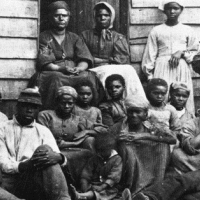Descendants of Native Americans’ Slaves Denied Right to Sue Fed for Monies Allegedly Collected on Their Land
 Slaves owned by a Native American tribe (photo: Hulton Archive via Getty Images)
Slaves owned by a Native American tribe (photo: Hulton Archive via Getty Images)
By Rose Bouboushian, Courthouse News Service
(CN) - Descendants of slaves owned by Native Americans cannot sue the federal government for allegedly collecting royalties on lands given to them post-Civil War, a federal judge ruled.
After the fall of the Confederacy, the United States signed treaties in 1866 that, in part, emancipated the slaves owned by the so-called "Five Civilized Tribes" - the Seminole, Cherokee, Choctaw, Creek, and Chickasaw - rendering them "Freedmen."
Decades later, the federal government enacted a 1908 law that removed all restrictions on tribal lands allotted under the 1898 Curtis Act, allegedly except those given to minors.
Over a century later, Leatrice Tanner-Brown and the Harvest Institute Freedman Federation - a legal advocacy group - filed a class action in the District of Columbia on behalf of all descendants of Freedmen who received land as minors.
Tanner-Brown says her grandfather, George Curls, was the son of former Cherokee slaves and, at age five, was enrolled as a Cherokee Freedman under the Dawes Act in 1902.
Eight years later, the Cherokee tribe gave Curls the deeds to 20- and 40- acre parcels of land in Nowata County, Okla., an area just north of the lucrative Alluwe Oil Field, where oil was found just 36 feet below the surface in 1904, the complaint states.
Though Section 6 of the act required the secretary of the interior to account for any royalties derived from leases on land allotted to minor Freedmen, the agency has no record of any royalties derived from any lease on Curls' allotments, according to the complaint.
According to the complaint, there was a "pervasive system of corruption and racism" in Indian Country, and the Department of the Interior recovered money on behalf of minor allottees.
The plaintiffs seek an accounting related to the alleged breaches of fiduciary duties.
The defendants, Interior Secretary Sally Jewell and Assistant Secretary for Indian Affairs Kevin Washburn, moved to dismiss.
U.S. District Judge Rudolph Contreras granted the motion Wednesday, relying upon the Seventh Circuit's 2006 ruling that "the wrong to the ancestor is not a wrong to the descendants" in In re African-American Slave Descendants Litig.
The court tossed aside a 2013 letter allegedly establishing Tanner-Brown "as a trust administration class member" in Cobell v. Salazar, each of whom had to have an injury directly traceable to the secretary's inaction in order to receive income from Indian trust assets.
"Plaintiffs do not offer the court any explanation as to how the injury that Ms. Tanner-Brown purportedly suffered in connection with the claims in Cobell is equivalent to any injury suffered in connection with plaintiffs' claim in this case," Contreras wrote. "The letter itself provides little context, devoid of any explanation as to how the class eligibility determination was made with respect to Ms. Tanner-Brown."
The court rejected the mostly century-old, "barely legible" 300-plus pages of exhibits.
"None of the documents indicate that Ms. Tanner-Brown has any interest in restricted land allotted to minor Freedmen," Contreras wrote. "Only a handful of these documents even refer to Ms. Tanner-Brown at all."
One file shows that at age 22, Curls transferred his interest in the allotted lands to J.B. Thompson, to whom Tanner-Brown does not claim to be related, according to the ruling.
Plus, the plaintiffs "do not actually allege that there was any oil or gas located on [Curls'] land," Contreras wrote (emphasis in original). "Nor do they allege that Mr. Curls' land was subject to any oil and gas leases or that he was entitled to royalties, let alone that his royalties were mismanaged."
The Federation also lacks constitutional standing based on its "cursory and conclusory allegations" about its membership, according to the ruling.
The parties have yet to return requests for comment emailed Monday.
About five years ago, the plaintiffs filed a similar suit calling the $3.4 billion Cobell settlement discriminatory against the descendants of slaves, which was dismissed in 2011.
To Learn More:
Why is Congress Turning over Public Lands to Foreign Copper Mine Companies? (by Noel Brinkerhoff, AllGov)
Utah and Arizona Pass Bills to Seize Federal Land; Sioux Indians Demand the Same (by Matt Bewig, AllGov)
- Top Stories
- Unusual News
- Where is the Money Going?
- Controversies
- U.S. and the World
- Appointments and Resignations
- Latest News
- Trump Announces He Will Switch Support from Russia to Ukraine
- Americans are Unhappy with the Direction of the Country…What’s New?
- Can Biden Murder Trump and Get Away With it?
- Electoral Advice for the Democratic and Republican Parties
- U.S. Ambassador to Greece: Who is George Tsunis?






Comments